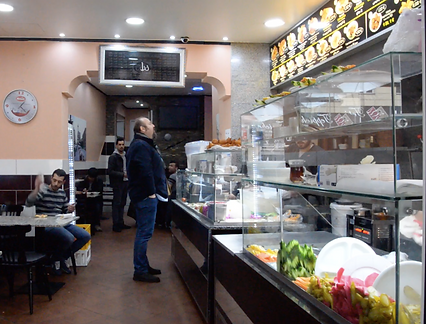
In-depth Look at the Syrian Society in Berlin
By Zeina Kanawati
This project came to my mind after my first visit to Berlin few months ago.
I went there to see my friends, and to eat! Everyone was saying that Berlin is now full of Syrian restaurants, and the food tastes just like home. So it was no surprise that I enjoyed the trip and the food, but I was also shocked, as I was in Europe feeling like home, and I was walking in the streets that looked so much like Damascus street with all the shops, the restaurants and the people. It smelled like home and it tasted like home, but it was not home, and the feelings were mixed, because you don’t really want to see your home somewhere else outside, and I was still visiting Syria, which didn’t look anything like home any more.
It felt like, as if home packed its people and moved to a new country.
The first thing occurred to my mind, is that people are really adapting very well in Berlin, they managed in a very short time (three years) to build their culture and environment in a totally different place, and they succeeded in getting over all the feelings of homesickness that come along such a huge and sudden displacement.
I thought this the best case of integration, and I decided to make my research about it, and film to document the situation.
However, the research showed a different result, and the adaptation I was thinking about, took a totally different shape.

I noticed that Syrians are communicating between eachother through the food that’s connected to all the good memories they shared back home.
The shop owners are trying to provide the exact same experience Syrians had back in Syria.
The shop names are all connected to the name of the country and the Syrian cities, the decoration, the music, and the ingredients are exactly the same as in Syria. And customers are mainly Syrians who are dealing with homesickness emotions, and are trying to feel better through communicating with their memories in recreating it in Berlin.
Syrians are war traumatised, and before reaching the safe lands, they individually experienced different kinds of struggles and challenges, and in most of the cases, they risked their lives and safety to be here now.

Knowing that going back home is not allowed as long as you’re a refugee feels like loosing your roots and the place you always belonged to. It’s somehow like a small death of the past life, and to continue your life, you need to find the way to communicate with your past, to be able to build a future.
The Syrian war is brutal and bloody, and Syrians felt abandoned and ignored by the rest of the world. The first step to heal is to start becoming closer to each other again, through sharing the lost memories together, by recreating it, and through providing the human first way of showing love and trust, it’s the food.
For this reason, and as a way of recovery, Syrians are not very much aware of the German community needs, they’re focusing more on what other Syrians need and want, for now it’s the easiest way to start adapting as a whole group, and the next step will follow, when Syrians start interacting more with the host society, and that will only start after the healing process ends, and that’s when the adaptation will take a better shape, and the food will serve again in communicating with the new culture in Germany.
A Different Story

By Zeina Kanawati
Most of the Syrian restaurants in Berlin are based in one area, . this a common behaviour of minorities within big societies, as they always try to stick together to recreate their culture and the environment they used to have back home, that’s why, if you visit Berlin looking for good Syrian food, you’ll immediately head to Neukölln, and choose what you want to eat from a big variety of restaurants.
However, there’s this one family who broke the stereotype and started their small cooking business outside Neukölln, in Charlottenburg. They are Um Mustafa and Abu Mustafa from Damascus.
Um Mustafa is in charge of the recipes and the cooking, while her husband and son help around in serving the customers and taking their orders.
With a limited financial resources and big dreams, they started what their small restaurant, without any former experience in running such a business, the family decided to use what they have to make a living, and to communicate with the new society through their traditional food.

Taking the business out of the busy area, makes this family a special one, by stepping out of the comfort zone, and taking the risk to introduce what they have not to other Syrians, but to a totally different society.
Abu Mustafa who used to work in archaeology, and history places around Syria, was used to deal with German groups and scientists who visited Syria and worked in heritage areas of the country.
The family insisted on serving us for free, and to take us inside the small kitchen where the famous stuffed meat balls are being cooked with sour yogurt to make “labaniyeh” and where old recipes inherited by many generations for years, are building a new future for the displaced hearts and souls of the Syrians who survived the new world’s most tragic war.